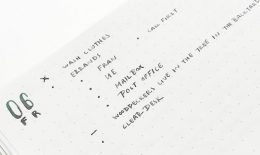J is for . . .

What is journaling?
So, what is journaling all about? Often talked about as a form of self-care next to a photograph of a beautiful notebook filled with intricate calligraphy and artistic doodles but it is much simpler than that. Of course, you can be as creative as you like with your journal; but, you needn’t be put off by worries of producing the ‘perfect’ journal or whether your handwriting is neat enough. Journaling can be tailored completely to your individual needs and wants.
Now, what on earth do you actually do? That’s the fun bit, as your journal is completely up to you! All you need is paper and pen, though there are a number of tools available to help you get started and provide inspiration.
Why is journaling good for you?
So, let's establish why journaling is a good for you. It can be beneficial to wellbeing in a number of ways, namely as a healthy way to express yourself, declutter your mind and help with organisation. Furthermore, journaling can help you clarify your thoughts and feelings which can lead to valuable self-knowledge and, as a result, it can help with mental health issues such as managing anxiety, reducing stress and coping with depression. If you choose to have a particular focus on mental health your journal can assist with tracking symptoms, recognising triggers and identifying negative behaviours and working to improve them. Journaling when feeling stressed will help you to pinpoint your emotions as sometimes feelings such as anxiety or fear present as feeling stressed. Journaling can then lead you to think about and notice how your feelings affect you, perhaps your stomach fills with butterflies, or you feel the onset of a headache. You can then look to identify what caused the stress or perhaps intensified it and see if a pattern appears. For instance, you may notice you feel stressed on days where you forget to eat breakfast or if you stay up a bit too late the night before. It can then be much simpler to work towards a resolution and work towards reducing your stress.
Different types of journaling?
Journaling can take many forms and each method can be adapted to suit exactly what you want to get out of your journal.

Bullet Journalling
Bullet journaling was developed by Ryder Carroll as an efficient way of managing daily tasks and to do lists. Carroll describes his system as one that “helps you organize your what while you remain aware of your why.” Bullet journaling helps users prioritise tasks, jot down observations, and regularly check in to assess the space these duties occupy. The act of writing things down can help to keep your mind uncluttered and remember what is important to you. Bullet journaling is best suited to those who want to be more organised. It advises the creating ‘bullets’ which are categorised as a task, an event or a note. You can then create a ‘collection’ to group bullets of a similar kind. Find out more at: https://bulletjournal.com/page...

Expressive Writing
Expressive writing is a form of therapeutic journaling and is akin to free writing. Research shows that this form of writing has a measurable impact on both mental and physical well-being. It does not focus on tasks or on relaying details from the day, but explores the stories that we tell ourselves and subsequently, provides an opportunity to understand and process our feelings and experiences. Expressive writing is deeply personal and free flowing. You can just see where your thoughts take you! Or perhaps use a journaling prompt to provide some focus or inspiration. This method often doesn’t follow a particular format and can be written without worrying about correct spelling, punctuation, and grammar. Implementing expressive writing into your journaling routine provides opportunities to dig deep and unearth new insight and understanding to help process grief, trauma, anxiety and other emotional difficulties.
Art Journaling
Perfect for those whose creativity is waiting to be unleashed art journaling welcomes the use of colour, paint and more! It is important to remember with art journaling that it is about the process and self expression, not the product. It is your personal journal and no rules apply!

Gratitude Journaling
Gratitude journaling does what it says on the tin. It’s about logging what makes you feel grateful. A common method is to list three things daily. This is a highly effective strategy for relieving stress because it helps you to focus on the resources you have in your life already and create a more positive mood which have been shown to build long-term resilience. A bonus benefit is that you are left with a record of the many lovely things that have happened throughout your days, so if you're feeling down in the future, you can cheer yourself up with a few pages of reminders for the things you have to appreciate in life.
Find out more:
There are lots of brilliant resources out there to help you get started with journaling. Take a look at the following to give yourself a head start!
- The power of journaling podcast
- For all things bullet journal visit youtube channel https://www.youtube.com/user/bulletjournal
- Informative and inspirational blogs Journaling.com and Vanilla Papers
- Inspiration on youtube from Amanda Rach Lee and Christine My Linh https://www.youtube.com/user/amandarachlee and https://www.youtube.com/user/christinemylinh
Journaling Prompts
As a beginner, or maybe if you are in need of inspiration, prompts can help to guide what you write in your journal. By answering a specific question your journal entry will be focused and perhaps cause you to pause and reflect on something you may not have given much time too. Prompts can also help you to get into the habit of daily journaling as it remove the time taken pondering what to write.

Guided Journals
If journaling still feels like an overwhelming activity there are lots of guided journals available which provide structure and focus, allowing you to pause and reflect whilst following the guide. Take a look below at some exampled of guided journals.
Feeling stuck?
Writing regularly can feel daunting and it can be tough to get started. Take a look at the top tips below to help you form the habit of journaling.
- Just start! The best thing to do is pick up a pen and start writing and see what comes out. Even if your first sentence is ‘I don’t know what I’m supposed to write’, the act of writing will soon take over.
- Forget about getting it ‘right’. There is no right or wrong, it is whatever suits you.
- Find a quiet place to write to minimise outside noise and distractions
- Write often. This is hardest to do as a beginner. Perhaps set a reminder to write for 15mins three times a week initially or stick to a specific time each day such as after dinner, or before bed. Eventually, it will become a regular habit.
References:
- https://www.urmc.rochester.edu/encyclopedia/content.aspx?ContentID=4552&ContentTypeID=1
- https://www.verywellmind.com/the-benefits-of-journaling-for-stress-management-3144611
- https://bulletjournal.com/
- https://psychcentral.com/blog/ready-set-journal-64-journaling-prompts-for-self-discovery#how-to-start
- https://journaling.com/podcasts/
